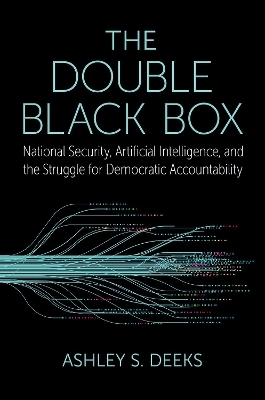
The Double Black Box
National Security in the Age of Algorithms
Seiten
2025
Oxford University Press Inc (Verlag)
978-0-19-752090-1 (ISBN)
Oxford University Press Inc (Verlag)
978-0-19-752090-1 (ISBN)
- Noch nicht erschienen (ca. Juni 2025)
- Versandkostenfrei innerhalb Deutschlands
- Auch auf Rechnung
- Verfügbarkeit in der Filiale vor Ort prüfen
- Artikel merken
The use of artificial intelligence has the potential to weaken democratic accountability for consequential national security choices. The Double Black Box explores how policymakers, military and intelligence officials, and lawyers in democratic states can reap the advantages of new technologies without surrendering their public law values.
The use of artificial intelligence (AI) has the potential to weaken democratic accountability for consequential US national security choices, including war. To ensure that these choices adhere to the public law values of rationality, legality, and accountability, we rely on Congress and the courts, as well as foreign allies, whistleblowers, and even US technology companies; their work, however, is hindered by the classified, 'black box' nature of the Executive's national security decision-making. The Double Black Box: National Security, Artificial Intelligence, and the Struggle for Democratic Accountability addresses these pressing challenges.
The rise of AI systems to enhance national security decision-making - or even make autonomous decisions - deepens this critique, because it is difficult to understand how AI algorithms, often described as 'black boxes,' reach their conclusions. How can we be confident that these AI systems comport with our laws and values? The widespread use of AI inside the national security ecosystem renders US national security choices even more opaque to the public, congressional overseers, US allies, and even the officials making the decisions.
This 'double black box' raises critical challenges for democratic accountability. Because China is committed to becoming the world leader in AI and faces fewer legal and values-based constraints on its pursuit of military AI, democracies' commitment to using AI in lawful and ethical ways will be tested. The book defines and explores this phenomenon and then identifies ways that policymakers, military and intelligence officials, and lawyers in democratic states such as the United States can reap the advantages of advanced technologies without surrendering their public law values.
The use of artificial intelligence (AI) has the potential to weaken democratic accountability for consequential US national security choices, including war. To ensure that these choices adhere to the public law values of rationality, legality, and accountability, we rely on Congress and the courts, as well as foreign allies, whistleblowers, and even US technology companies; their work, however, is hindered by the classified, 'black box' nature of the Executive's national security decision-making. The Double Black Box: National Security, Artificial Intelligence, and the Struggle for Democratic Accountability addresses these pressing challenges.
The rise of AI systems to enhance national security decision-making - or even make autonomous decisions - deepens this critique, because it is difficult to understand how AI algorithms, often described as 'black boxes,' reach their conclusions. How can we be confident that these AI systems comport with our laws and values? The widespread use of AI inside the national security ecosystem renders US national security choices even more opaque to the public, congressional overseers, US allies, and even the officials making the decisions.
This 'double black box' raises critical challenges for democratic accountability. Because China is committed to becoming the world leader in AI and faces fewer legal and values-based constraints on its pursuit of military AI, democracies' commitment to using AI in lawful and ethical ways will be tested. The book defines and explores this phenomenon and then identifies ways that policymakers, military and intelligence officials, and lawyers in democratic states such as the United States can reap the advantages of advanced technologies without surrendering their public law values.
Ashley S. Deeks is the Class of 1948 Professor of Scholarly Research in Law at the University of Virginia Law School and a Faculty Senior Fellow at the Miller Center. She is an elected member of the American Law Institute, a member of the State Department's Advisory Committee on International Law, and a contributing editor to the Lawfare blog. In 2021-22 she worked as the Deputy Legal Advisor at the National Security Council. Before joining UVA, she served for ten years in the U.S. State Department's Office of the Legal Adviser. She graduated with honors from the University of Chicago Law School and clerked on the Third Circuit Court of Appeals.
| Erscheint lt. Verlag | 19.6.2025 |
|---|---|
| Verlagsort | New York |
| Sprache | englisch |
| Maße | 156 x 235 mm |
| Gewicht | 3 g |
| Themenwelt | Informatik ► Theorie / Studium ► Künstliche Intelligenz / Robotik |
| Recht / Steuern ► EU / Internationales Recht | |
| Recht / Steuern ► Öffentliches Recht | |
| Recht / Steuern ► Strafrecht ► Besonderes Strafrecht | |
| ISBN-10 | 0-19-752090-1 / 0197520901 |
| ISBN-13 | 978-0-19-752090-1 / 9780197520901 |
| Zustand | Neuware |
| Informationen gemäß Produktsicherheitsverordnung (GPSR) | |
| Haben Sie eine Frage zum Produkt? |
Mehr entdecken
aus dem Bereich
aus dem Bereich
Buch | Softcover (2024)
REDLINE (Verlag)
20,00 €
die materielle Wahrheit hinter den neuen Datenimperien
Buch | Hardcover (2024)
C.H.Beck (Verlag)
32,00 €


